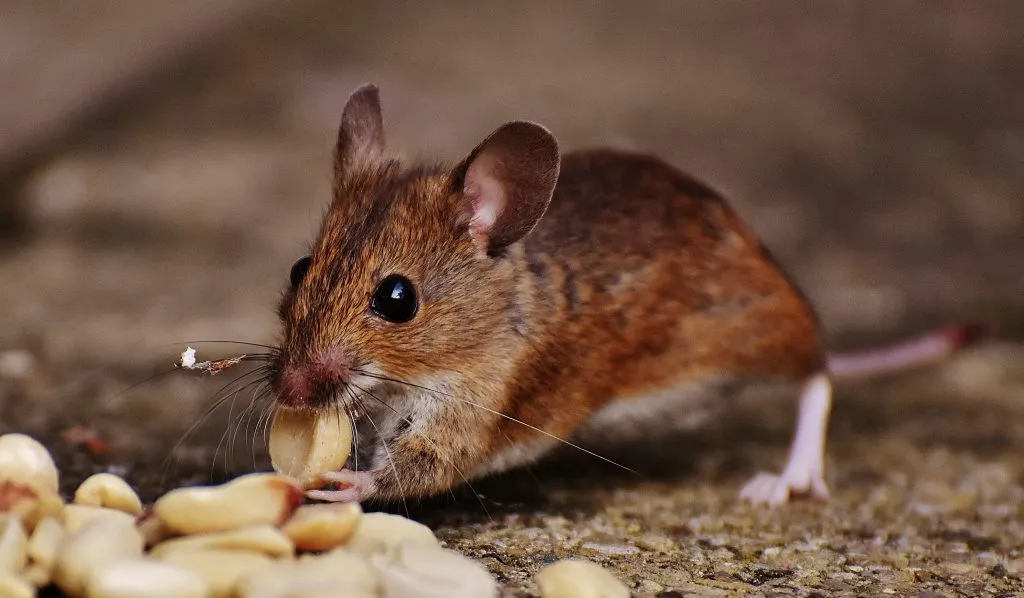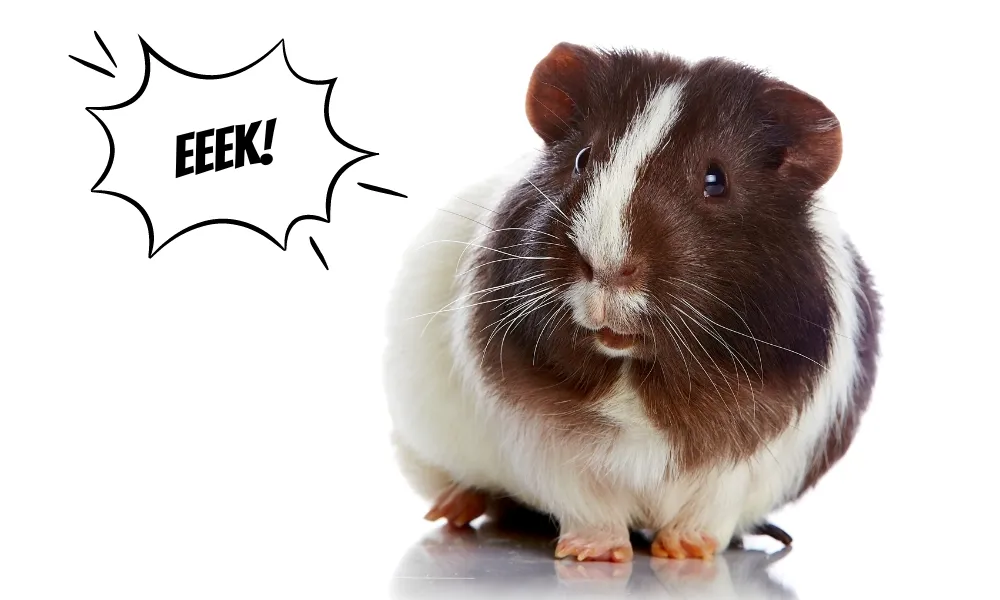Did you know that mice are sensitive to high screeching voices and bright lights? Even being chased by a cat can cause stress-induced symptoms, injuries, and shock.
So does it mean that mice can die of shock?
Here’s the answer,
Yes, mice can die of shock. However, it depends on the mice’s current condition.
When mice go through shock or stress, their heart rate drops, leading to a heart attack.
As a pet mouse owner, it is important to be aware of the signs that hint your mouse is in shock.
Let’s have a look at those signs!
Table of Contents
Signs That Your Mouse Is In Shock
Your pet mouse can act oddly sometimes, leaving you confused. These behaviors will tell you how a shocked mouse behaves.
So, I created a list of 5 behavioral habits a mouse shows when it is stressed.
1. Panicky Grooming
Mice spend a moderate amount of time grooming themselves.
But, when you find a mouse actively grooming itself, you need to stay alert.
Your mouse is under high stress if you find bald patches here and there in its fur.
2. Wagging Its Tail
When annoyed or stressed out, a mouse wags their tail.
A dog wags its tail when happy, so it may look like a good sign that the mouse is happy. But it is the opposite in the case of mice.
This typical behavior is similar to men tapping their fingers when they are anxious.
3. Ear Pointed Up or Down
The position of a mouse’s ear can give you a hint about its mental health.
A perked-up ear can mean that they are curious. Down and pointed-out ears tell opposing behavior.
Only a stressed-out mouse will be alert toward its surroundings.
4. Hiding in Corners
When a mouse is shocked, it becomes defensive toward everything around it.
For example, it will avoid being around you, hide in the box’s corners, refuse to eat, etc.
In this case, you can put some sand or soil in the box. You will find the mouse, dig tunnels, and create hiding places for itself.
5. Change in Sleeping Habits
There will be many small or big changes in its behavior. The sleep cycle can totally overturn around.
Mice will spend most of their time sleeping, staying on guard, or showing aggression if they feel shocked.
What Are Some Causes of Mouse Shock?
1. Sudden Changes in Surroundings
Many different reasons can cause stress in your pet mouse. The first stressor is a sudden change in the mice’s surroundings.
If mice are exposed to a new environment, they get distressed.
Sometimes staying out of their sight or grabbing them by the tail can raise their anxiety level.
Isolation is one of the easiest ways to shock a mouse. Sometimes people do it to their pet mouse without even realizing it.
2. Bright Light and High Screeching Voices

Mice have very strong senses, which often leads to the mice getting easily shocked.
These nocturnal creatures prefer to live alone in quiet and dark places.
Hence, high-pitched frequent noises and bright lights leave mice psychologically stressed.
They can overcome it in a day or so. However, if it happens frequently, it can result in a significant shock.
3. Being Attacked
Mice are mostly active at night because there is a lesser chance of being attacked.
They receive a huge amount of shock if they go through an incident of getting chased by a cat or any other predator.
Mice’s strong senses alert them when a predator is near them.
But, as cats are larger and faster, they can easily get to a mouse. The experience of getting attacked can affect a mouse so badly that it can die out of shock.
How Long Does Shock Last In Mice?
How fast mice can rebound depends largely on the source of the shock.
According to the severity of the shock, the recovery time can be 30 minutes or past days.
A stressed mouse can go through another shock wave if it re-encounters major stressors.
Mice are very sensitive creatures. Shocked mice tend to show symptoms of stress and anxiety. There are treatments and cures available. But it takes a while for them to heal mentally.
Researchers carried out medical tests on the topic of how long a shock can last in mice.
Dr. Frank McMillan said,
“The animal can not tell us how or what caused him a shock and whether his fears are generated from that shock.”
One of the common misconceptions can be just showering them with love. Animal welfare showed that mice could exhibit shock if not treated properly.
Make sure to monitor your mouse’s every move to recognize its needs early on. This way, your pet will easily rebound and get better.
How To Save Your Mouse From Shock?
1. Provide Care and Comfort
The most obvious way to save your pet mouse can be by providing them with care and comfort. Make them feel secure and safe around you.
Board-certified behavior analyst Bright said,
“Never use techniques that shock an animal. It can damage the bond between the animal and the owner and make it aggressive.”
2. Prepare a Habitat with a Hideaway
Mice tend to live alone. Prepare a habitat with a hideaway in it.
Stelow from animal welfare said,
“Create a safe space for your pet. If he likes to hide, let it hide, and don’t try to mess up when it is in its safe space.”
3. Consult a Vet
Approach your mouse slowly, and let it come to you on its own. Create a comfort zone around you. Later, you should call the vet and do a proper checkup.
Tips To Prevent Mouse From Shock
Mice are timid creatures who can easily feel threatened. You can sometimes create some stressful environments around them without even realizing it.
To prevent your mouse from getting shocked, you need to know more about them.
These 7 tips mentioned below will help you save your pet mouse from shock.
1. Let Your Mouse Feel Safe Around You
We have to start from the very basics-the right environment. Mice have poor eyesight but a sharp sense of smell.
They can easily feel threatened if an unknown smell gets close to them.
Maintain a safe distance while letting it get used to your scent.
When your mouse puts down its guard, it’s time for the next step.
2. Provide Comfort
Start approaching your mouse with some treats. See if it feels comfortable to take them from you.
If it does, then talk to them in slow hushed voices. This is because mice can pick up very low sounds.
This is another way of helping your mouse feel secure around you.
3. Create a Safe Space
Safe space refers to a hiding place. Mice love to hide in small pipes, tunnels, and holes. Create an environment where they can play, hide, and run however they wish.
4. Monitor its Behavioral Pattern
This time give treats directly from your hands. Try to reassure your mouse around you by caressing it.
Play with it sometimes, and show it that you are a friend. Shocked mice change their sleeping cycles, and stop eating.
Try to rebound their schedule back to normal again.
5. Train Them
When your pet mouse is healthy, let it smell different food, your used clothes, etc. This helps mice connect to you.
Add a spinning wheel, for them to work out or add sand to dig holes and tunnels.
You can also play some soft music regularly near your mice to teach them that sound is not a threat.
6. Company of Another Mouse

Mice are social beings. Female mice can use the company of other mice. However, if it’s male, it’s better not to leave it alone with another male.
If there are two male mice in a cage, the submissive mouse receives some harsh treatment from the rebellious mouse. It can cause shock, which can turn vital.
7. Keep Them Away from Stress-Inducing Factors
Mice are active at night, away from bright lights and noises. Another reason behind this is the least possibility of incoming danger.
Refrain from exposing them to flashing lights or sounds of cats and dogs.
A Quick Recap:
In this article, we have seen that a mouse can die out of shock because of a sudden drop in its heart rate.
Mice can also get shocked because of a number of reasons like being attacked, long screeching noises, crowded places, change of habitat, etc.
It is not easy to find out why they are shocked. But you need to be careful or it may die out of carelessness.
The fastest way to cure your mouse from shock is by comforting them. Create a safe space where they can relax, and approach them when they are not on alert around you.
Keep them away from any type of stress. Also, treat it medically to know how bad the shock is.
Want to learn more about mice? Feel free to read Do Wild Mice Move Their Babies.
